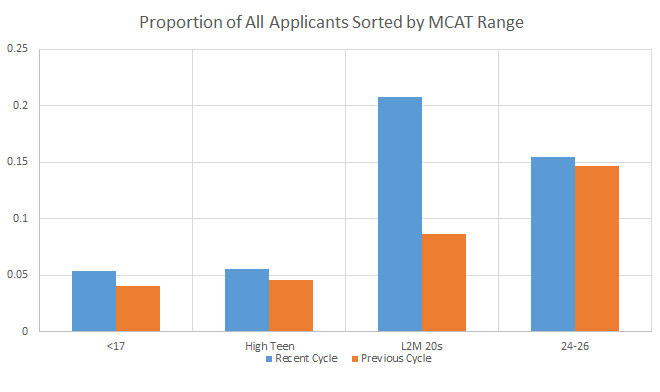If true, you would expect there to be a shift in the ages of applicants from cycle to cycle. Luckily, the AAMC gives us the data to answer just this question here:
https://www.aamc.org/download/321468/data/factstablea6.pdf
And, as you can see, there is no change.
You have the right idea, but the data isn't quite there. The table show that on the aggregate, the average age of applicants has not changed. But it doesn't need to change for my argument to work. You would need data showing the breakdown of how many straight out of college applicants are admitted and how many have taken more time off. This is because whether you take the new MCAT or not is linked to one crucial factor - when you're applying. At least in the cycle that that table is based off of. In other words, the only case where you would take the new MCAT now instead of later is that you're applying that cycle. Therefore, the vast majority of people who took the new MCAT and applied with it were students who applied straight out of college. There were some who retook the MCAT but this is a minority. If applicants who had taken more time off
were more competitive to begin with, then they
always were admitted at a higher rate. The aggregate doesn't show this kind of data. And since, for that cycle, they are the ones who predominantly have only old MCATs, applicants with old MCATs would be admitted at a greater rate. They weren't admitted
because of the old MCAT but rather because people who took time off and people who took the old MCAT and applied with it are inextricably linked.
To put it more concretely, an example is always helpful. Imagine 20 people applying to med school. 10 are applying straight out of college (average age 22) and 10 are applying after taking one or more years off (let's say average age 26). This gives an aggregate average age of 24. Now, let's say that because of the time off, the latter 10 are more competitive. So 6/10 are admitted, whereas only 3/10 are admitted of the first group. Therefore, the second cohort is more competitive than the first group and boasts a 60% acceptance rate over the 30% of the first cohort. Overall, your table would show that the average age of applicant is 24.
Okay, so now we're in the 2015 application cycle. As I said, the only people who are applying with the new MCAT are in the first cohort (very small minority of people from second cohort). Again, same exercise. 20 people, with 10 being 22 years old and 10 being 26 years old. Average age is still 24. Acceptance rates are still the same because there's no reason to believe that anything has changed. 6/10 for the second cohort and 3/10 for the first one. Now remember - the second cohort mainly has old MCAT only and the new cohort mainly has new MCAT. Put another way, the applicants applying with only new MCAT has an acceptance rate 1/2 that of the applicants who are applying with only old MCAT! Oh, no! Bring the old MCAT back!
So you can easily tell from this exercise that the new MCAT did nothing but bring out this subtle division in the applicant pool that aggregate data on age cannot.


